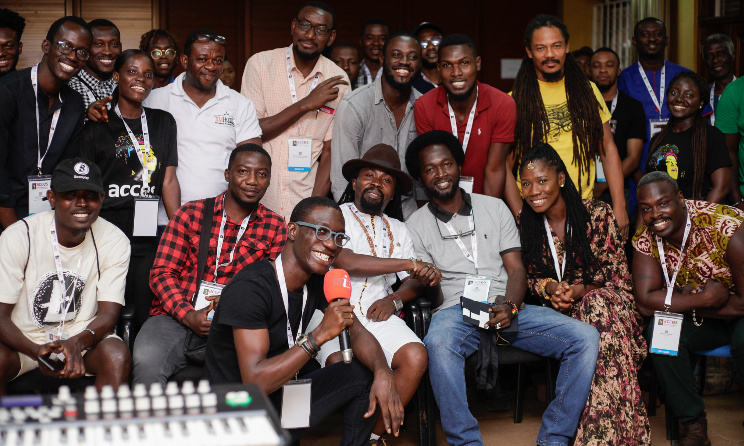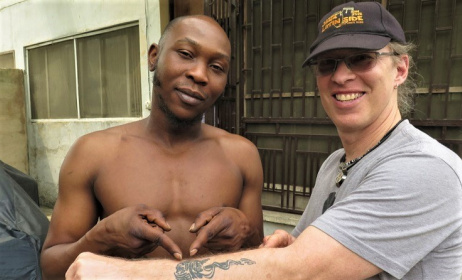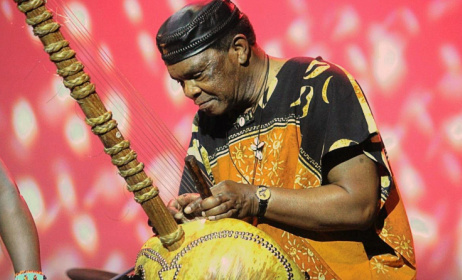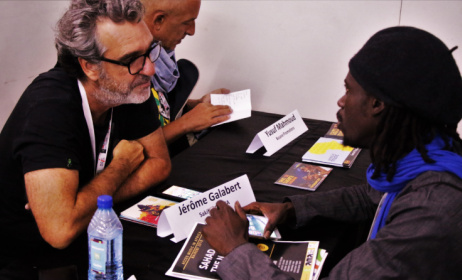Music education in Africa
If there is a place in the world where music education should be prioritised, it is Africa. This is because the continent is arguably the most diverse in terms of musical cultures, which should be preserved and passed onto future generations as a matter of priority. After all, many of Africa’s musical traditions, especially in West Africa, are the progenitors of modern music around the world and can be seen as the living historical and cultural treasures that created the foundations of popular music as we know it.
 Facilitators, producers and artists pose for a photograph during a production workshop that was part of the 2019 Music In Africa Conference for Collaborations, Exchange and Showcases in Accra, Ghana. Photo: Paul Addo
Facilitators, producers and artists pose for a photograph during a production workshop that was part of the 2019 Music In Africa Conference for Collaborations, Exchange and Showcases in Accra, Ghana. Photo: Paul Addo
Many African musical traditions face the risk of disappearing in the absence of efficient formal or even informal educational structures. There are a number of organisations doing great educational work across the continent, but there also exist numerous challenges and new opportunities in every country.
As much as education is important in continuing the heritage of forgotten or disappearing traditions, it is also crucial for the creation of sustainable music careers, especially in an industry where competitiveness pits artists against each other for a shot at success and where technological advancements change the rules of the game faster than we realise.
But education in music need not only be possible through traditional models and institutions like universities and colleges. Nowadays, collaborations, artist residencies and workshops can also go a long way in educating music professionals to become leaders in the global music industry.
This is why Music In Africa publishes a great deal of opportunity articles through which musicians can apply to be part of workshops, residencies, music competitions and training seminars where they can improve their skills and become more worldly and competitive in the process.
We also have a number of overview texts about the music education sectors in various African countries and tutorial videos on instrument building and music theory lessons, as well as music business tips and links to our directory where you can find information about musical institutions, private tutors and online educators, among others, all below:
Overview texts
- Music education in Zambia
- Music education in South Africa
- Music education in Eritrea
- Music education in Ethiopia
- Music education in Togo
- Music education in Ghana
- Music education in Cameroon
- Music education in Zimbabwe
- Music education in Kenya
- Arts education in DRC
- Music education in Nigeria
- Music education in Uganda
- Music education in Rwanda
- Music education in Chad
- Music education in Mali
Instrument Building and Repair Project
- How to build a marimba – part 1 of 4
- How to build a marimba – part 2 of 4
- How to build a marimba – part 3 of 4
- How to build a marimba – part 4 of 4
- How to build a dulcimer guitar – part 1 of 4
- How to build a dulcimer guitar – part 2 of 4
- How to build a dulcimer guitar – part 3 of 4
- How to build a dulcimer guitar – part 4 of 4
- How to build an umakhweyana
Wanda-full Artistik Concret series
- How to self-produce
- How to be an individual in music
- How to market research
- How to pre-produce
- How to record an album
- How to produce and arrange
- How to mix and master
- How to write a biography
- How to distribute
- How to promote an album
- How to upload music online
- How to license your music
- How to publish your music
- How to claim royalties
- How to get booked for gigs
- How to be a music entrepreneur
Instrument lessons
- Introduction to keyboard harmony
- Keyboard harmony: The dominant 7th chord chain
- Keyboard harmony: The major 7th chord chain
- Keyboard harmony: The minor 7th chord chain
- Rhythmic and body percussion lessons
- Guitar lesson 1: Basic finger exercises
- Guitar lesson 2: Staccato
- Guitar lesson 3: Legato
- Guitar lesson 4: Bar chords
- Guitar lesson 5: Intervals - Minor and Major 2nds and 3rds
- Guitar lesson 6: Major and minor triads
- Melodic Reading and Writing
- Rhythmic Reading and Writing
- Chisamba Rhythm
- Harmony – The Major 13th Chord
- Understanding music production
- Learn to play an instrument to better your music production
Knowledge articles
- ACCES 2019 interview: IDOL and Ditto Music
- Mokoomba manager Marcus Gora talks about band's success
- Swansong: Red Bull Music Academy shares entire video catalogue
- Deezer Africa editor: We curate the best local content
- CityVarsity offers world-class creative and music production courses
- West Africa: How to stem copyright infringement
- Study: Music Industries in Africa
- Agnes Nonsizi: Controversial publicity doesn't work for all
- The Kitchen Sink Model: A digital strategy for musicians
- Polishing your EPK
- Amped Studio 2.0: A revolution in online music making
- How to get the most from a music trade event as a pro
- Releasing an album: East African case study
- What you should know about split sheets
- What you need to do to get booked abroad
- Video discussion: Opportunities for women in music
- How to get your music video on Trace TV
- An introduction to sound engineering
- Interview: SA sound engineer Garrick Van Der Tuin
- Interview: SA sound engineer Gavan Eckhart
- Video discussion: Sound challenges in Africa
- Sheer Music boss on how to survive digitisation – part 1
- Sheer Music boss on how to survive digitisation – part 2
- The role of music managers – part 1
- The role of music managers – part 2
- How African artists can make money on YouTube
- 5 questions to ask before choosing a digital distributor
- Video discussion: Music education in Kenya
- Video discussion: How to monetise songwriting
- Video discussion: Digital distribution in Africa
- Panel discussion: How to break into the international music scene
- Panel discussion: The African music sector
- Panel discussion: The Ethiopian music scene
- Namibia: Elemotho on how to get booked for music festivals
- Hip hop: The basics of freestyling
- The relevance of music education to the Ethiopian educational system
- Music education policy development and advocacy in East Africa
Also be sure to check out the Music In Africa directory for educational resources:




























Comments
Log in or register to post comments